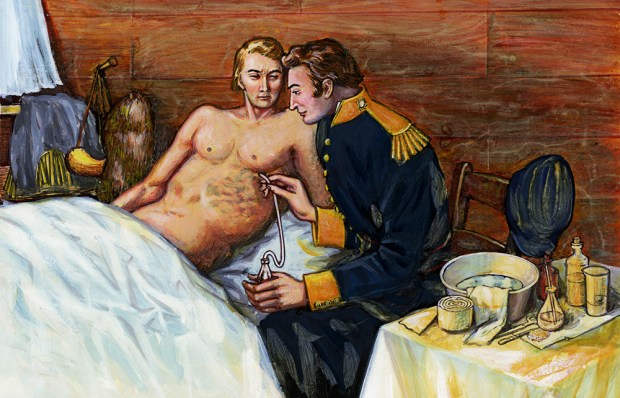D.J. Taylor is a Norfolk native who, un-usually, has stayed put. These stories, written during the pandemic, are all set in that county, though the author is largely uninterested in its more fashionable acreage – the strip of coast so popular with Sunday supplements and London owners of second homes. He writes instead about the ‘other’ Norfolk, which is comparatively unmonied, flat as a map, and barely gets a look-in from the SUVs speeding north.
Most of these stories feature men, often young men, though in ‘New Facts Emerge’ a harried City businesswoman finds her Christmas plans imperilled by the obstructions of a sexist superior. She finally snaps when the colleague’s soullessness and the grind of the commute from Diss push her past breaking point. Taylor is good on work, a difficult, sometimes baneful, subject for even the best fiction writers. He is especially adroit at showing its effect on his younger protagonists, and how they seem simultaneously buoyed by the promise of their fledgling careers yet deflated by the monotony of the work itself. As the hero of ‘Out Wroxham Way’ discovers, his future seems best served by evading the obstacles that impending adulthood has introduced – ‘all those devitalising influences, rapt and self-willed, bent on stopping him from becoming the person he was meant to be’.
The progress of the best stories is pleasingly unpredictable: Taylor is at pains to avoid obvious resolutions or insert equally obvious twists. ‘Lost Johnny’ recalls a classmate who rejoices in the name of Jonathan Bennington-Smith. Having enjoyed brief celebrity as a pop star, he is encountered years later in a new incarnation that unexpectedly apes his momentary fame. ‘The Reunion’, about an old boys’ dinner, cleverly reveals the remarkable persistence of schooldays’ emotions – an unrequited love, and animus, that has refused to die even 40 years on.
The stories are subtly composed and elegantly written. The narrative voice is attractively wry, and particularly acute in its choice of telling detail. Its air of savouring diffidence, moreover, is curiously reminiscent of Anthony Powell, particularly in our sense that behaviour is being observed far more than judged. No one should be deterred by the Norfolk setting, for only in the most literal sense is this provincial fiction. After Stewkey Blues, I for one would happily read Taylor about anywhere: Swaffham and Snoring (Little or Great), to be sure, but also Timbuktu.
Got something to add? Join the discussion and comment below.
Get 10 issues for just $10
Subscribe to The Spectator Australia today for the next 10 magazine issues, plus full online access, for just $10.
You might disagree with half of it, but you’ll enjoy reading all of it. Try your first month for free, then just $2 a week for the remainder of your first year.














Comments
Don't miss out
Join the conversation with other Spectator Australia readers. Subscribe to leave a comment.
SUBSCRIBEAlready a subscriber? Log in